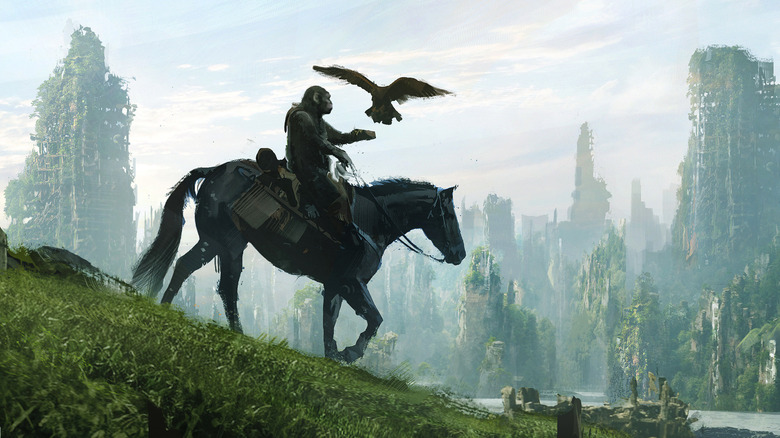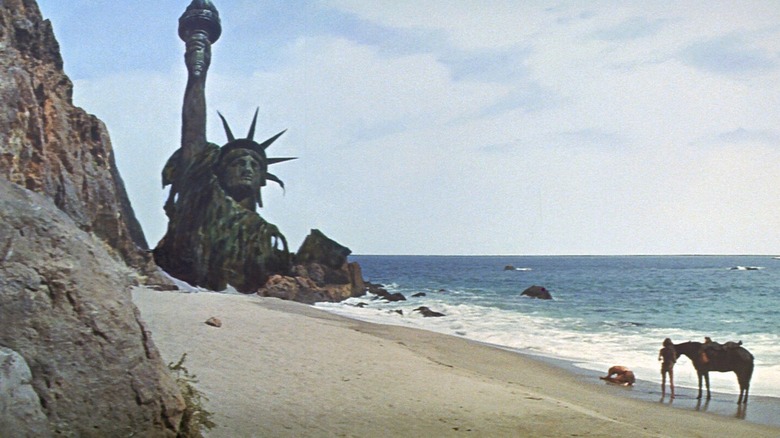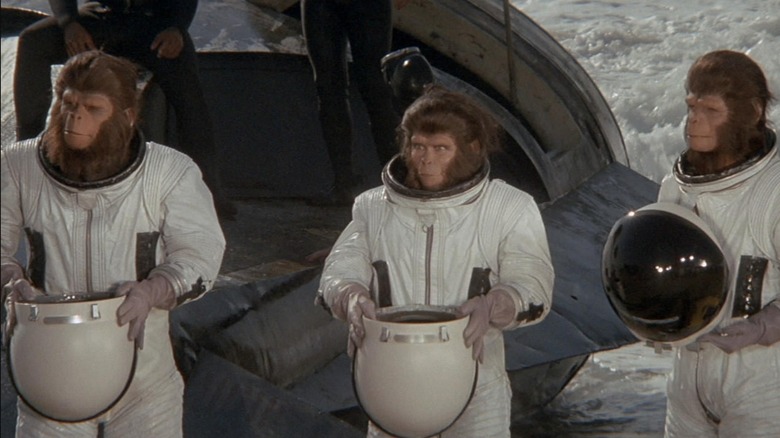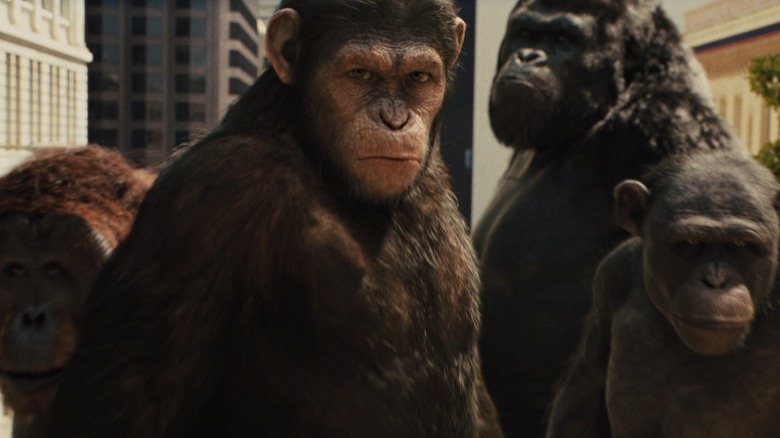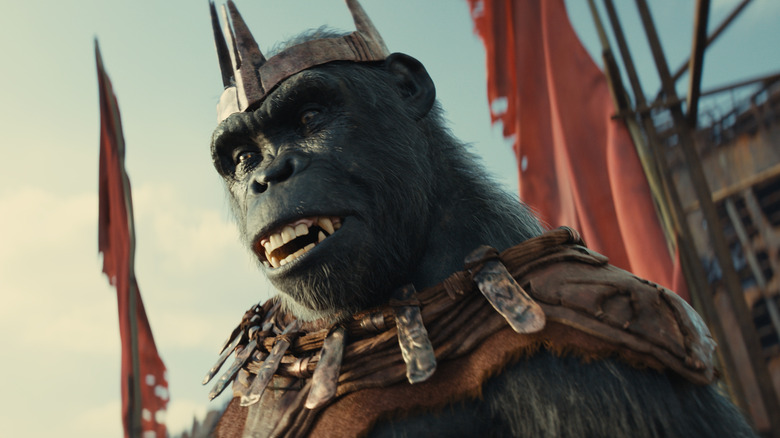An Attempt To Decipher The Timeline Of The Planet Of The Apes Franchise
By now, "Planet of the Apes" fans have made peace with the fact that, despite representing one of the longest-running and widely influential franchises ever made, these simian stories aren't typically considered a frontrunner for the best or most successful franchises in cinema history. The spotlight inevitably goes to more traditional picks, and it's easy to figure out why. The "Apes" movies don't have a sexy "hook" (which is ironic, given the 1968 original stars Charlton Heston and Linda Harrison wearing an absolute minimum of clothing for most of the runtime) compared to most others, opting for a much nerdier, more thoughtful, and eminently pessimistic approach to sci-fi. Those of us who'd consider ourselves initiated in this club, however, would say those are the fundamental reasons that make "Planet of the Apes" so great and so idiosyncratic, at the same time.
Then again, maybe the relatively insular nature of the series can be explained elsewhere. For obsessives like ourselves (and, let's face it, that's exactly what you are if you clicked on an article titled, "An Attempt to Decipher The Timeline of The Planet of the Apes Franchise"), much of the "Apes" appeal is that the unique property can't resist thoroughly downer endings, razor-sharp social commentary, and a penchant for twisting official canon into knots to keep the sequels coming. It's that last part, however, that requires a bit of a deep dive.
With the upcoming "Kingdom of the Planet of the Apes" due to arrive in 2024 and most recently answering a longstanding question about when exactly it will be set (a whopping 300 years after the ending of 2017's "War," according to Empire), we're taking the opportunity to untangle decades of confusing continuity and decipher the official timeline of "Planet of the Apes" franchise.
Humble beginnings
You maniacs! There's something to be said for the fact that, despite featuring one of the most famous final reveals in cinematic history, the original "Planet of the Apes" follows a fairly straightforward plot (by "Apes" standards, of course) compared to what would follow in its footsteps. Three surviving astronauts crash land on Earth over 2,000 years after first launching in 1972, with Heston's George Taylor convinced they've arrived on some alien world. Though first-time viewers spend almost the entirety of its runtime under the same impression, the very idea of time-dilation effects, space exploration, and time travel all provide our first real signpost of the wacky, sci-fi shenanigans to come. By the end of his journey, Taylor arrives at the horrifying conclusion that his home world has been taken over by an intelligent civilization of apes and humans now occupy their former place in the food chain. Basically, Earth circa 3900 AD is a bad, bad place for Homo sapiens. Simple enough, right?
The 1970 sequel "Beneath the Planet of the Apes" picks up where its predecessor left off, slowly building out this dystopian future to focus on militaristic apes bent on war, a mutant group of telepathic and nuclear bomb-worshipping humans living (where else) beneath the surface of the planet, and more information about the nuclear war in 1992 that led to all this in the first place. Things don't improve much from there, building to a desperate underground battle between humans and apes to prevent the latter faction from setting off the Alpha Omega doomsday warhead. Mortally wounded and utterly fed up with the world, Taylor hits the detonation switch himself and blows up the entire planet ... which you'd think would've ended the franchise once and for all. Not quite!
Journey to the past
Do you know what's even better than advanced apes in a futuristic nightmare? Advanced apes in our nightmarish present! That was essentially the elevator pitch for "Escape from the Planet of the Apes," which was given the unenviable task of retconning the previous movie and finding a way to keep the bad times rolling despite such a — let's call it conclusive — end. The solution: Take fan-favorite ape characters (okay, fine, they're actually chimpanzees) Dr. Cornelius (Roddy McDowall) and Dr. Zira (Kim Hunter), have them conveniently repair Taylor's spaceship just before he detonates the planet-destroying bomb, and ride its shockwave all the way back 2,000 years to Earth's past. That's right, baby, we're now in 1973, the year after Taylor and his fellow astronauts blasted off.
Naturally, their actions end up causing massive ripple effects on the timeline. (Or, depending on where you fall on the great "You can't actually change the past" debate, simply do what they'd always done to set the events of the films in motion.) The very existence of these advanced apes from the future threatens humanity's most powerful figures, beginning the fractures that would eventually become an impasse between both species. Now fugitives on the run, Zira and Cornelius face an even greater complication: the birth of their newborn son Milo (renamed Caesar). Though his parents are brutally killed, the movie ends with Caesar alive and beginning to talk.
From there, "Conquest of the Planet of the Apes" picks up in 1991, when all primates are now treated as slave labor. The story documents Caesar's rise to revolutionary leader and the troubling trajectory that will see his kind eventually take over the world. The final movie of the originals, "Battle for the Planet of the Apes," wraps up both Caesar's story in the early 21st Century and the saga overall ... doesn't it?
Rise of the next Planet of the Apes
Not so fast! 2011 brought a much-needed reinvigoration of the "Apes" franchise (the less we say of the 2001 movie, the better), setting a new story in our contemporary times that, funny enough, also followed an ape named Caesar (Andy Serkis) and documented his rise to revolutionary leader. Of course, plenty of Easter eggs and references implied that this new movie could be treated as either a prequel to the original movie or another alternate timeline. Either way, the soon-to-be trilogy unfolded with a strong emphasis on Caesar's arc and the steady takeover of the world. The details are slightly different from the original movies, such as a Simian Flu weakening humanity and paving the way for apes to fill the power vacuum (as opposed to nuclear war), but the end result is largely the same. In "War for the Planet of the Apes," humanity is truly on its last legs while Caesar's tribe of apes are left in prime position to flourish in their new promised land.
A new kingdom and a new status quo
Finally, there's "Kingdom of the Planet of the Apes." Don't worry, that awfully wordy title isn't the only way this upcoming movie stays true to the spirit and tradition of the originals. As we've broken down previously on /Film, the new setting feels like yet another major shift for the franchise ... but one that's also very familiar. With Empire confirming the time jump as another 300 years after the events of "War," all the pieces are now clicking into place. Based on the trailer, the surviving humans look almost exactly as regressed and primitive as the ones seen in the very first movie. The apes are now wearing clothes, live in ramshackle cities and settlements, and are speaking the Queen's English with ease. In short, it sure feels like Taylor and his astronauts could show up at any moment if it weren't for the fact that this new movie is only taking place sometime around 2300 A.D.
That's the question of the day, naturally: Is the plan for this next sequel (and, ideally, the ones that come after) to continue to chart its own course and tell brand-new stories in this rich and unexplored timeline of the series, or is it about to loop all the way back around to the events of the original movie? "Kingdom" director Wes Ball is quoted in the Empire article as saying that, "We had these grand ideas of where ['Kingdom'] could ultimately go and how it could fit into the legacy of [the originals]." There are many ways to interpret a statement like that, but let's put it this way — we're pretty excited to see where this all goes.
"Kingdom of the Planet of the Apes" arrives in theaters on May 24, 2024.
